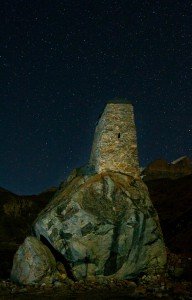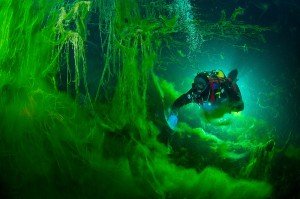 In this project we continue our investigations, explorations and research in to the underwater world of Russia, in to the unknown to expand our knowledge of this hidden world and to push the envelope of human endeavor.
In this project we continue our investigations, explorations and research in to the underwater world of Russia, in to the unknown to expand our knowledge of this hidden world and to push the envelope of human endeavor.
Blue Lake is a beautiful karst spring which is located in Kabardino-Balkaria in the Caucasian mountains in the South of Russia.
At 235m in length, 130m wide and 258 m deep Blue Lake is currently considered to be the deepest karst lake-source in the world and shares first place with the Red lake (Crveno Yezero, Yugoslavia) as the deepest karst lake.
It’s sheer size is not the only reason to consider this lake a unique natural object. With the water temperature of approximately 9oC from the bottom to the surface it offers excellent conditions for the preservation of artifacts. The lake offers enormous potential for discovering a host of historically significant objects on the bottom. The Blue Lake has been an intersection of world history since the time of peoples’ migration from Africa to Europe and for thousands of years people have thrown things in to the lake expecting them to disappear forever.
It is difficult to imagine what discoveries await the inquisitive explorer of the lake, from the precious weapons of Tamerlane’s troops to Second World War Romanian army equipment, from the oldest evidence of human history to the trucks laden with Georgian port wine circa 1920 which has probably matured nicely over the years.
The amount of water which comes out of the lake is huge. The water carries up about 35 – 50 m3 of dissolved rocks every day. This proves the existence of a very deep and significant cave system in the lake.
Blue Lake Awareness Project participants:
- Martin Robson, deep diver, cave explorer and record-breaker.
- Team of scientists from Perm Science Institute, headed by the rector of Perm Science Institute (Russia), Doctor of Geological and Mineralogical Sciences Nikolai Maksimovich.
- Italian geomorphologist, professor of Turin University, Naica Cave pioneer Giovanni Badino.
- Directors of Research Center “Blue Lake”, champions of Russia in deep diving Igor Galayda and Roman Prokhorov.
- Natalie Avseenko, twice world champion in free diving.
Our project consisted of 4 parts:
 Photoshooting and gathering of information; People who live here did not see the horizon for several thousands of years. For them, the distance does not matter. The only important thing is the concept of the vertical. In their fairytales, a hero shoots an arrow to the sun, the first people come from the sky and the way to get beyond the grave is through the well on the edge of the village. Their heroes never go to distant unknown lands; their every waking moment filled with conquering mountains or descending hills. Here, according to the beliefs of these people, there is unreachable sky over their heads and a bottomless lake beneath their feet – the Blue Lake. Of course they have a lot of legends about the lake. They tell us about formation of the lake, its shape, etc., and – this is some kind of mysticism – these stories were confirmed by scientists.Blue Lake Awareness Project Photo Gallery
Photoshooting and gathering of information; People who live here did not see the horizon for several thousands of years. For them, the distance does not matter. The only important thing is the concept of the vertical. In their fairytales, a hero shoots an arrow to the sun, the first people come from the sky and the way to get beyond the grave is through the well on the edge of the village. Their heroes never go to distant unknown lands; their every waking moment filled with conquering mountains or descending hills. Here, according to the beliefs of these people, there is unreachable sky over their heads and a bottomless lake beneath their feet – the Blue Lake. Of course they have a lot of legends about the lake. They tell us about formation of the lake, its shape, etc., and – this is some kind of mysticism – these stories were confirmed by scientists.Blue Lake Awareness Project Photo Gallery Freediving part; Natalie Avseenko, twice world champion in free diving set non-official cold water record in CWT discipline: she reached 61m in water 90C. Also we did some photoshooting for the book about Blue lake. Natalia posed underwater in national dress as a hero of a local legend.
Freediving part; Natalie Avseenko, twice world champion in free diving set non-official cold water record in CWT discipline: she reached 61m in water 90C. Also we did some photoshooting for the book about Blue lake. Natalia posed underwater in national dress as a hero of a local legend.- Scientific part. Giovanni Badino, the pioneer of the Naica Crystal cave, and Nikolay Maksimovich, famous Russian scientist, came to study the lake and to define the most important and perspective places for exploration by divers.
 Expedition headed by Martin Robson. The diving team tried to find the cave and took samples of water, rocks and silt for scientific research.
Expedition headed by Martin Robson. The diving team tried to find the cave and took samples of water, rocks and silt for scientific research.
Blue Lake story is very dramatic, it is a story of human intention, human passion to explore the world. Heroes of this story are similar to of those people who discovered American continent, who conquered North and South poles, who climbed the mount of Everest.
Not all of them came back from their quest, but we still honor their names: Robert Scott and Ernest Henry Shackleton, James Cook and Francis Drake, George Mallory, Andrew Irvine and many others.

